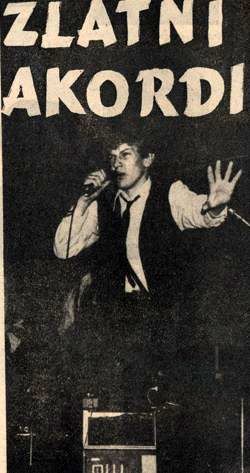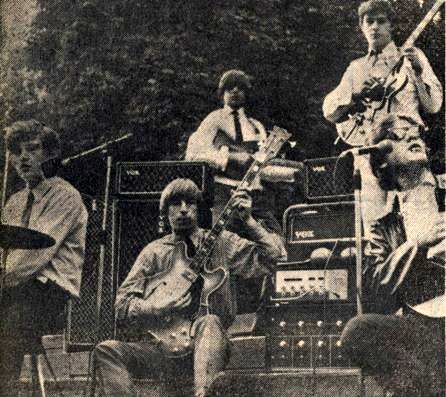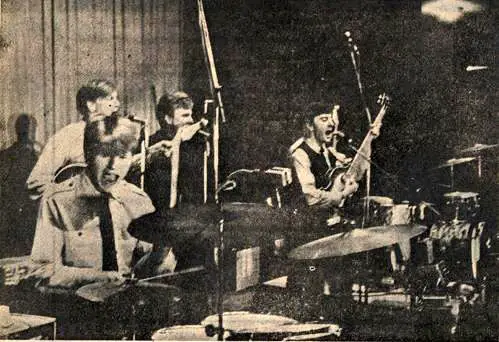The vocal-instrumental band Zlatni Akordi (Translation: Golden Chords) was a Croatian rock band formed in Zagreb in 1963, and it remained active until 1981. During its less than two-decade existence, the band featured notable names from the Yugoslav music scene, including Josipa Lisac and Zlatko Pejakovic on vocals, Zlatko Miksic (Fuma) on bass guitar, Rajko Dujmic and Davor Stern on organ, as well as many others.
Zlatni Akordi was originally formed as a dance band, primarily performing at dance events, particularly at the Student Center in Zagreb. They became renowned for their performances in this venue for nearly a decade. Initially, their repertoire featured hits from the 1960s, but as the band’s line-up evolved, so did their musical range, expanding to encompass music from artists such as The Mamas & The Papas to Jimi Hendrix.
In 1966, Zlatni Akordi released their first EP under Јugoton Production. This EP featured three cover renditions of well-known international hits (“My Generation,” “Lady Jane,” and “You Were on My Mind”), with lyrics sung in the Serbian-Croatian language by Ivica Djukic. The fourth track on the EP was an instrumental version of the traditional Dalmatian song “Marice Divojko,” for which the music and arrangement were composed by Pero Gotovac.

The preparations for recording this EP were extensive, reflecting the band’s commitment to delivering high-quality music. Zlatni Akordi believed that having top-notch musical equipment would enhance the quality of the songs, especially the instrumental version of “Marice Divojko”. To achieve this, the band acquired VOX amplifiers and three-tone batteries, along with Fender guitars. This investment in quality equipment was quite remarkable for a young band, given the expense and the superior sound quality of the gear. However, their dedication to delivering an excellent live performance and sound was their top priority.
When they told their parents about their plans, they got pocket money, which was not enough, so they took on the task of selling vegetables and fruits at a market in Zagreb. This endeavor allowed them not only to raise enough money for the desired equipment but also to repay their parents honestly. Following the release of their first recording, “Marice Divojko” quickly became one of the most frequently played and requested songs. It gained popularity not only at student parties but also at their concerts, which became more frequent as the band’s fame grew.
The song “Marice Divojko” marked a significant milestone for Zlatni Akordi as it can be regarded as their first independent creation. The band’s members, who were already seasoned in beat music, had no trouble with both performing and composing this piece. Their proficiency in playing multiple instruments, especially their close relationship with the piano and harmonica, made the process seamless.

An intriguing fact about the remake of “Marice Divojko” is that it originated in a basement in Zagreb. This was where the band held their rehearsals from Monday to Friday and diligently crafted their repertoire. Every Saturday, they delighted their fans by unveiling two new compositions, primarily covering international hits but giving them a distinctive twist in the “Zlatni Akordi” style.
Another intriguing fact about the band is their early focus on performing songs by The Kinks and The Who. Their devotion to these bands didn’t go unnoticed, and an overseas guest worker managed to inform The Kinks about a Yugoslav band playing their music. This led to a series of exchanges and correspondence between the two bands.
“Marice divojko” and the rest of the songs performed by the band, were the occasion and reason for “Zlatni Akrodi” to win the “Golden Guitar” award from the jury and the “Silver Cup” from the audience at a festival, and they are the only band that played in the “Club of Journalists” in Zagreb, where the instrumental version of “Marice divojko” was enthusiastically received.
After recording “Marice divojko” on their first EP, Dzerald Ferovic – Kaza, Zlatko Miksic, Ivica Miksic, Zheljko Marinac, and Zlatko Slobodzenski found success on the Yugoslav rock scene. They played gigs in the prestigious bar “Splendid” in Dubrovnik and received an invitation to perform in Beirut from the Lebanese National Television.












